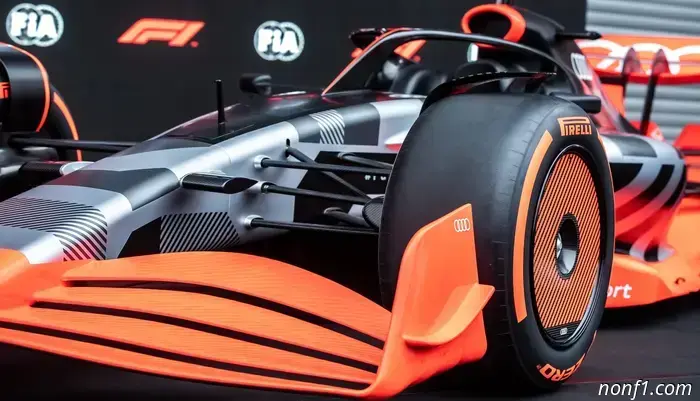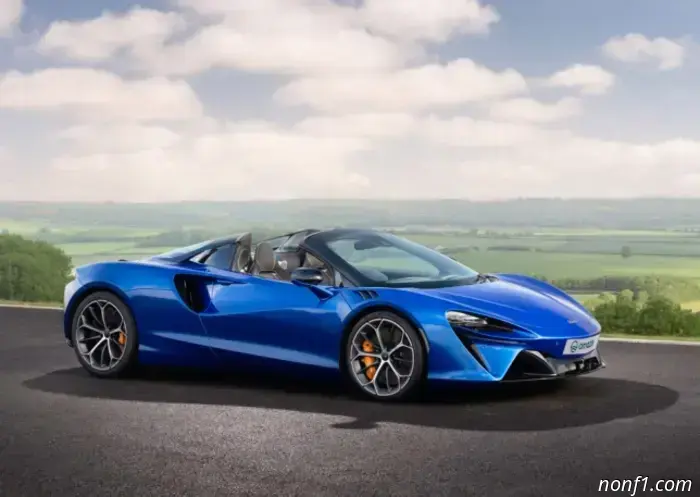
2026 F1 Cars Are More Than a Second Slower Per Lap, Yet FIA Claims ‘It’s Not Important’
Cristiano Barni
Get The Drive’s daily newsletter
The latest car news, reviews, and features.
Formula 1 teams have been intensely focused on the 2026 regulations for quite a while, but they won’t have a clearer picture of their new machines until they approach next year's pre-season testing. For now, they can only carefully analyze data from driving simulators and wind tunnels to make informed predictions. So far, one of these forecasts indicates notably slower lap times.
In an interview with Motorsport.com, FIA single-seater director Nikolas Tombazis acknowledged that current simulations for the 2026 cars (especially regarding aerodynamics) suggest lap times could be up to 1.5 seconds slower than the existing cars.
“In our simulations, the new cars will be between one and two-and-a-half seconds slower at the start of the regulations, and evidently, there will be developments that will help them gain speed,” Tombazis stated to Motorsport. “To be fair, we don’t have data from all the teams, and we’re uncertain about the precise downforce levels of each. Some teams that may not get their setups right initially could potentially be even slower than our simulations, but we don’t expect lap times to become a major discussion point.”
More surprisingly, however, was Tombazis’s response to the concerns from drivers, teams, and fans regarding slower lap times and the prospect of F1 evolving into a race focused on energy and tire management. The former designer for Benetton, McLaren, and most recently Ferrari, dismissed these worries, expressing his “surprise” and suggesting that “it actually doesn’t matter.”
“I am somewhat surprised by the level of focus on actual lap times,” said Tombazis. “The sport has experienced various phases where cars were either slower or faster, and I think once people adapt, it’s fine. If you exit a simulator or transition from one car to another that is a second and a half slower, your initial thought might be ‘this isn’t a good car,’ because that second and a half is noticeable. But once you get accustomed to it, it genuinely doesn’t matter.
“I really don’t think lap times will be an issue once people adapt to these cars. Initially, it’s a comment you make when you notice the difference, but I don’t realistically see it as a significant concern, nor do I believe it will differ vastly from what we have now,” he added.
I find it somewhat surprising that the upper echelons of the FIA are not worried about slower lap times for the latest and most advanced F1 cars. Racing on dozens of circuits worldwide knowing that you’ll complete laps significantly slower than in previous years can't be an encouraging thought for the drivers, engineers, mechanics, and other personnel across the paddock. If speed and lap-time performance aren't your focus, then what exactly is the priority?
Nonetheless, like many complicated situations, F1 car performance is not a straightforward issue. As Tombazis rightly pointed out, F1 cars have experienced variations in speed over the years due to changes in engine, tire, aerodynamics, and safety regulations. It wouldn't be the first instance of a new vehicle lapping a track slower than its predecessors. Therefore, while there's no reason to be alarmed about the initial stage of the new regulations, the challenge remains that these new cars are considerably more complex and costly to develop, yet ultimately, they will be slower.
Do you think lap times are important?



Other articles
 British female fan of Norris won... McLaren
Rebecca Francis, at 62, remains a Formula 1 fan and is especially fond of Lando Norris. Perhaps that's why she decided to take part in a charity raffle for the first time in her life...
British female fan of Norris won... McLaren
Rebecca Francis, at 62, remains a Formula 1 fan and is especially fond of Lando Norris. Perhaps that's why she decided to take part in a charity raffle for the first time in her life...
 Formula 1 fights counterfeits in Las Vegas
FOM management has filed a lawsuit against two companies that were selling counterfeit products bearing Formula 1 branding...
Formula 1 fights counterfeits in Las Vegas
FOM management has filed a lawsuit against two companies that were selling counterfeit products bearing Formula 1 branding...
 Gary Anderson: Cadillac needs to find a young driver
It seems Cadillac F1 have settled on Sergio Pérez and Valtteri Bottas, but that doesn't mean everyone is willing to accept that decision as the right one...
Gary Anderson: Cadillac needs to find a young driver
It seems Cadillac F1 have settled on Sergio Pérez and Valtteri Bottas, but that doesn't mean everyone is willing to accept that decision as the right one...
 In Zandvoort they do not regret turning down the Grand Prix.
The director of the Dutch Grand Prix, Robert van Overdijk, on the upcoming round and plans for the future…
In Zandvoort they do not regret turning down the Grand Prix.
The director of the Dutch Grand Prix, Robert van Overdijk, on the upcoming round and plans for the future…
2026 F1 Cars Are More Than a Second Slower Per Lap, Yet FIA Claims ‘It’s Not Important’
When the F1 cars of next year take to the track, they will be significantly slower than those from previous years, "although they won't be as slow as F2."
